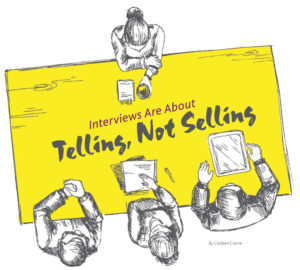 “Interviews are broken and many candidates take broken interviews and break them even more.” Eric Kramer, ‘Active Interviewing’
“Interviews are broken and many candidates take broken interviews and break them even more.” Eric Kramer, ‘Active Interviewing’
When Pierre was asked to explain why he was fired from his last job, he blamed the company for his inappropriate behavior. A caller phoned in to a radio show I was guesting on to ask if he needed to tell an interviewer he’d had cancer 10 years prior. Figuring out what is appropriate to do and say in an interview can be challenging.
It is said that one is interviewed for one’s skills and hired because of “fit.” At the same time, it is essential to be extremely well prepared before setting out on a job interview. With more and more people being professionally coached on interviewing techniques, you can count on the competition being up on their game as well.
Instead of thinking of yourself as an employee, think of yourself as someone who provides a service and benefit. Follow these tips to prepare and perform like a star performer in any interview situation:
1. When you are called for an interview, ask: the names and titles of the interviewers, how long the interview will be and confirm the style of interview, more than likely it will be behavioral based. If you have a choice, choose an interview time when you are at your best. The time of day isn’t as important as when you shine most brightly.
2. Research the company. Use the internet, annual reports and media. Ask employees, or ex-employees, about the ins and outs of the company and about the people you are slated to meet with.
3. Write out answers to speculated questions. Identify 8-10 skills that you anticipate will be targeted and write out your Situation, Action and Result (SAR) stories for each one. Make each story no more than three minutes with the emphasis on your actions and the benefit/result that ensued.
4. Call the interviewers voice mail after hours and listen to their voice to get an idea of how they present themselves. Notice the tone of voice, the pace at which they speak and the cadence; do they exude confidence, timidity, authority, even boredom. Emulate their volume and pace once in the interview. Like begets like.
5. Keep the same daily routine, follow your regular pattern of sleep and activity before the interview. Do deep breathing exercises if you are nervous. Be aware of what you eat the night before and be sure to freshen your mouth before you arrive. Never smoke before and if you are chewing gum, dump it before you enter the building.
6. Don’t watch or listen to the news or read emotional sections of the paper, the morning of. Stay focused on the interview, not on upsetting world or local events. Stay positive and upbeat any which way you can, which includes a peaceful home front as well.
7. Dress for success. Even casual day should find you in a suit or as professionally attired as your industry dictates. No scents, high, high heels or loud ties or jewelry. Nothing less than a collared shirt, gentlemen.
8. Make eye contact with each interviewer as you answer a question. With a panel, go around the table and end up back at the person who asked you the question. Smile intermittently.
9. Memorize your 3 Minute Presentation in answer to the question, Tell Me About Yourself.
10. Have your own personal agenda. Ask questions. Interview the interviewer. Be prepared to discuss up to date issues related to their industry and payroll initiatives. Show them you have done your homework and that you have something to offer from a knowledge and skill perspective.
11. Illustrate strategic thinking, be creative, outline what you imagine doing in the position and/or company 30, 60 and 90 days down the road. TELL about yourself in relationship to company needs.
12. Always turn your weakness answer into a positive. Do not mention a weak or unacquired skill that is pertinent to the position. Do not mention a character flaw.
13. Never bring up salary or benefits.
14. The Best Interview Question of All Time. Before an interview is over you want to find out how well you did. You want to know about any objections there are to hiring you. The question to ask is:
“Based on my background, experience, and skills, what do you think would be the greatest challenges for me in this position?”
15. The Last Must Ask Question. Leaving an interview without knowing the next step is frustrating and nerve wracking. Before you stand up to leave, ask,
“How and when should I follow up with you?”
16. Send a thank you letter or card within 36 hours after the interview, an email is not enough . People delete emails, out of sight, out of mind. Cards stay on desks in sight of the recipient and others.
17. Prepare a form that allows you to jot down your thoughts and feelings about each interview for review purposes. Detail what took place and what you could do better next time.
As interview coaches will tell you, “practice, practice, practice.”
Colleen Clarke
Author of Networking How to Build Relationships That Count &
Get a Job and Keep It
Colleen Clarke is a career specialist, corporate trainer, author and workplace coach. Her edu-taining style inspires audiences and individuals to take ownership and action.

 “Interviews are broken and many candidates take broken interviews and break them even more.” Eric Kramer, ‘Active Interviewing’
“Interviews are broken and many candidates take broken interviews and break them even more.” Eric Kramer, ‘Active Interviewing’